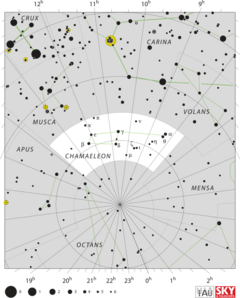Astronomy:Iota Chamaeleontis
| Observation data Equinox J2000.0]] (ICRS) | |
|---|---|
| Constellation | Chamaeleon |
| Right ascension | 09h 24m 09.22580s[1] |
| Declination | −80° 47′ 12.7597″[1] |
| Apparent magnitude (V) | 5.34[2] |
| Characteristics | |
| Spectral type | F3/5 III/V[3] |
| U−B color index | +0.01[4] |
| B−V color index | +0.454±0.003[2] |
| Astrometry | |
| Radial velocity (Rv) | −3.57±0.66[1] km/s |
| Proper motion (μ) | RA: -138.690[1] mas/yr Dec.: +134.928[1] mas/yr |
| Parallax (π) | 17.3878 ± 0.0925[1] mas |
| Distance | 187.6 ± 1.0 ly (57.5 ± 0.3 pc) |
| Absolute magnitude (MV) | +1.52[2] |
| Details | |
| Radius | 3.63+0.10 −0.13[1] R☉ |
| Luminosity | 20.244±0.136[1] L☉ |
| Temperature | 6,429+63 −90[1] K |
| Metallicity [Fe/H] | −0.04[5] dex |
| Rotational velocity (v sin i) | 129.7[6] km/s |
| Age | 1.2±0.1[2] Gyr |
| Other designations | |
| Database references | |
| SIMBAD | data |
ι Chamaeleontis, Latinized as Iota Chamaeleontis, is a single[8] star in the southern circumpolar constellation of Chamaeleon. It is visible to the naked eye as a dim, yellow-white hued point of light, having an apparent magnitude of about 5.3.[2] Based upon parallax measurements,[1] this star is around 188 light years away from the Sun, but it is drifting closer with a radial velocity of −4 km/s.[1]
Spectra of the star taken in different years have been given types of F3IV/V and F5III, leading to a mean published type of F3/5 III/V, with the suspicion that the spectrum is variable. It is an F-type star, likely an evolving subgiant.[9] It is 1.2[2] billion years old with 3.6[1] times the Sun's radius. The star has a high rate of spin with a projected rotational velocity of 130 km/s,[6] which is giving it an oblate shape with an equatorial bulge some 9% larger than the polar radius.[10] It is radiating over 20[1] times the Sun's luminosity from its photosphere at an effective temperature of 6,429 K.[1] An infrared excess suggests a circumstellar disk of dust is orbiting at a distance of 8.3 astronomical unit|AU from the star with a mean temperature of 200 K.[11]
References
- ↑ 1.00 1.01 1.02 1.03 1.04 1.05 1.06 1.07 1.08 1.09 1.10 1.11 1.12 1.13 Brown, A. G. A. (August 2018). "Gaia Data Release 2: Summary of the contents and survey properties". Astronomy & Astrophysics 616: A1. doi:10.1051/0004-6361/201833051. Bibcode: 2018A&A...616A...1G. Gaia DR2 record for this source at VizieR.
- ↑ 2.0 2.1 2.2 2.3 2.4 2.5 Anderson, E.; Francis, Ch. (2012). "XHIP: An extended hipparcos compilation". Astronomy Letters 38 (5): 331. doi:10.1134/S1063773712050015. Bibcode: 2012AstL...38..331A.
- ↑ Houk, N.; Cowley, A. P. (1975). University of Michigan Catalogue of two-dimensional spectral types for the HD stars. Volume I. Declinations -90_ to -53_ƒ0. Bibcode: 1975mcts.book.....H.
- ↑ Mermilliod, J.-C. (1986). "Compilation of Eggen's UBV data, transformed to UBV (unpublished)". Catalogue of Eggen's UBV Data. Bibcode: 1986EgUBV........0M.
- ↑ Nordström, B. (2004). "The Geneva-Copenhagen survey of the Solar neighbourhood. Ages, metallicities, and kinematic properties of ˜14 000 F and G dwarfs". Astronomy and Astrophysics 418: 989–1019. doi:10.1051/0004-6361:20035959. Bibcode: 2004A&A...418..989N.
- ↑ 6.0 6.1 Reiners, Ansgar (January 2006), "Rotation- and temperature-dependence of stellar latitudinal differential rotation", Astronomy and Astrophysics 446 (1): 267–277, doi:10.1051/0004-6361:20053911, Bibcode: 2006A&A...446..267R
- ↑ "iot Cha". SIMBAD. Centre de données astronomiques de Strasbourg. http://simbad.u-strasbg.fr/simbad/sim-basic?Ident=iot+Cha.
- ↑ Eggleton, P. P.; Tokovinin, A. A. (September 2008). "A catalogue of multiplicity among bright stellar systems". Monthly Notices of the Royal Astronomical Society 389 (2): 869–879. doi:10.1111/j.1365-2966.2008.13596.x. Bibcode: 2008MNRAS.389..869E.
- ↑ Allen, J. S.. "The Classification of Stellar Spectra". http://www.star.ucl.ac.uk/~pac/spectral_classification.html. Retrieved 1 January 2014.
- ↑ van Belle, Gerard T. (March 2012). "Interferometric observations of rapidly rotating stars". The Astronomy and Astrophysics Review 20 (1): 51. doi:10.1007/s00159-012-0051-2. Bibcode: 2012A&ARv..20...51V.
- ↑ Cotten, Tara H.; Song, Inseok (July 2016). "A Comprehensive Census of Nearby Infrared Excess Stars". The Astrophysical Journal Supplement Series 225 (1): 24. doi:10.3847/0067-0049/225/1/15. 15. Bibcode: 2016ApJS..225...15C.
 |

